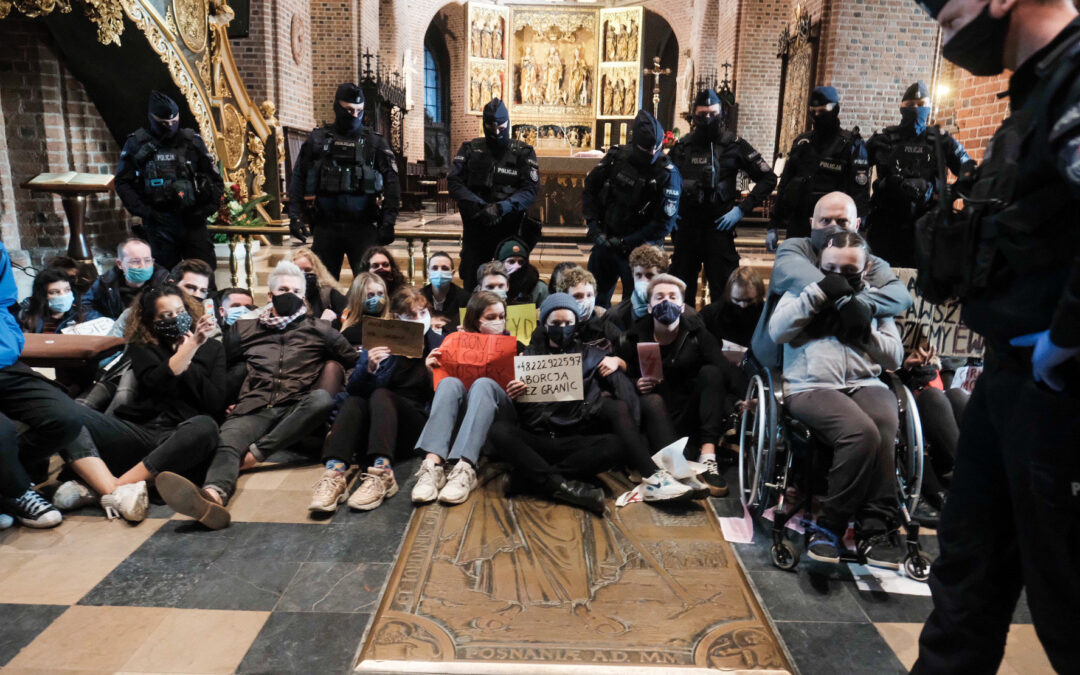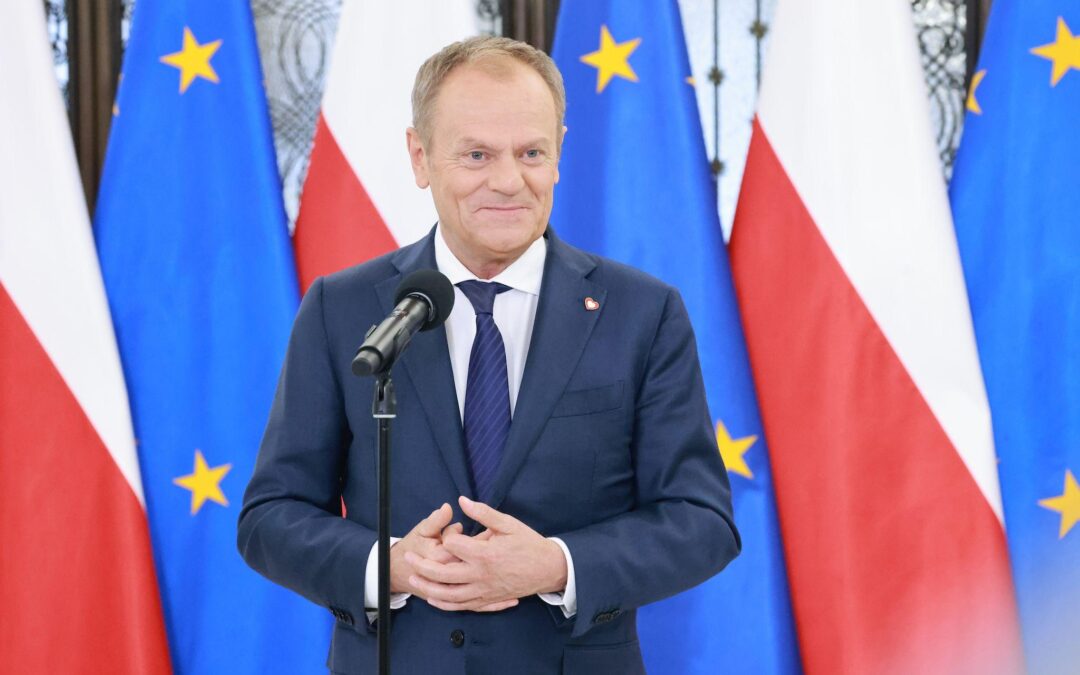A group of 32 demonstrators who held a protest against Poland’s near-total abortion ban in a cathedral during Sunday mass have been acquitted of “maliciously interfering with a religious act”, a crime that carries a sentence of up to two years in prison.
The judge found that the protesters had not shown malice in their actions. She also noted that the protest came in response to an abortion ban that “violated women’s rights” and which had been publicly supported by the Catholic church, including the archbishop of the city where the protest took place.
The court’s verdict can, however, still be appealed by prosecutors, who have been seeking to have the activists punished for their actions, which took place during a wave of mass protests in autumn 2020.
Poznań. Kobiety przerwały mszę w katedrze. Interweniowała policja. "Mamy tego dość jako katolicy". Więcej w relacji: https://t.co/LlqEGUhUBU @EpiskopatNews @Abp_Gadecki #aborcja #piekłokobiet pic.twitter.com/T5cp18RIwc
— Piotr Żytnicki (@PiotrZytnicki) October 25, 2020
The incident occurred on 25 October of that year, which was the first Sunday after the Constitutional Tribunal (TK) issued a ruling that effectively outlawed almost all abortions in Poland.
The participants stood in front of the altar in Poznań Cathedral shouting “My body, my choice” and “The episcopate should stay away from politics”. They waved signs reading “Abortion is not a sin” and dropped leaflets promoting women’s right to decide on terminating pregnancies.
The presiding priest asked them not to interrupt the ongoing mass, but this was ignored and the police were later called to end the demonstration. Prosecutors later charged 32 protesters, who pleaded not guilty. Their trial began in December 2021.
An activist is going on trial for "helping terminate a pregnancy", a crime that carries a prison sentence of up to 3 years in Poland.
She sent abortion pills to a woman who wanted to end her pregnancy, but the husband discovered them and called the police https://t.co/cFXucjFdqy
— Notes from Poland 🇵🇱 (@notesfrompoland) March 29, 2022
In a ruling announced today, Poznań’s district court found the protesters not guilty. In her oral justification for the verdict, the judge, Joanna Knobel, noted the context in which the incident had taken place, reports the Polish Press Agency (PAP).
“These were the largest demonstrations in Poland since the political changes in 1989 and, in the opinion of some commentators, the largest street protests in the history of Poland,” said the judge, adding that they were aimed at not only the TK but also the ruling party and the Catholic church, which had endorsed the abortion ban.
Knobel pointed out that, on the day that the TK issued its ruling, the archbishop of Poznań, Stanisław Gądecki, who is also head of Poland’s episcopate, published a statement expressing “great appreciation and joy” regarding its decision.
Poland's abortion protests result from "cultural Marxists" using streaming and social media as "tools to shape the young", says the head of the Catholic episcopate
"Almost every Netflix series for young people promotes homosexuality," warns the archbishop https://t.co/ItHZsUbuI1
— Notes from Poland 🇵🇱 (@notesfrompoland) November 4, 2020
The judge then noted that, while the protesters had interrupted the religious ceremony, “the evidence did not show that their intentions were motivated by malice, i.e. the desire to annoy, hurt, or cause unpleasant feelings in another person”.
She cited the testimony of one of the accused, who said that the protest was motivated by “the actions of church hierarchs who, in the persons of Gądecki and [Archbishop of Kraków Marek] Jędraszewski, publicly expressed admiration for the restriction of human rights and civil liberties of millions of Polish women”.
The judge herself then argued that “the TK’s ruling in effect violated women’s rights”, that “church hierarchs approved of that ruling”, and that the “constitutional separation of state and church is commonly violated” in Poland.
"It is our duty to thank God for the gift" of ruling party chairman Jarosław Kaczyński and his late brother, former President Lech Kaczyński, the archbishop of Kraków declared at a mass marking the 72nd anniversary of the twins’ birth https://t.co/sWIgkHti7v
— Notes from Poland 🇵🇱 (@notesfrompoland) June 19, 2021
Meanwhile, she noted that the protesters had shown “respect” for the sacred building in which they were demonstrating and had not incited hatred towards or attacked religion. “None of the defendants showed contempt for the performance of the religious act itself, nor for the place where this religious act was performed.”
“The protesters wanted to show what they think about the disputed issue, to express their position on the judgment of the Constitutional Tribunal, the archbishop’s words and the church’s involvement in politics,” said Knobel.
Prosecutor Bartosz Pawlaczyk told PAP that they would await the judge’s full written justification before deciding whether to appeal.
Publicly insulting the church or interrupting mass would be punishable by up to three years in prison under a proposed toughening of Poland's blasphemy laws unveiled today by two deputy justice ministers https://t.co/Qs568O91jC
— Notes from Poland 🇵🇱 (@notesfrompoland) April 14, 2022
One of the defendant’s lawyers, Mateusz Bogacz, welcomed the ruling, saying that it “underlined the right of citizens to protest, even if they are opposed by politicians, the authorities and the Catholic church”. He suggested that prosecutors, who are “controlled by politicians”, had brought the case for “political” reasons.
In November, the government’s majority in parliament voted to strip an opposition MP of her immunity from prosecution in order to face charges of offending religious feelings, a crime in Poland that carries a sentence of up to two years in prison, for protesting against the abortion ruling in a church.
However, earlier this month a court in the city of Toruń ordered that proceedings against her be discontinued, a decision that prosecutors can appeal.
In 2021, the main leader of Poland’s abortion protests, Marta Lempart, was charged by prosecutors with the crimes of insulting police officers, causing an epidemiological threat and publicly praising crimes. Later that year another of the protests’ leaders was also indicted.
Parliament has stripped opposition MP @JoankaSW of immunity so that she can be prosecuted for offending religious feelings, a crime that carries a sentence of up to two years in prison.
She protested in a church against Poland's near-total abortion ban https://t.co/bv2InxacB2
— Notes from Poland 🇵🇱 (@notesfrompoland) November 5, 2022
Main image credit: Piotr Skornicki / Agencja Wyborcza.pl

Daniel Tilles is editor-in-chief of Notes from Poland. He has written on Polish affairs for a wide range of publications, including Foreign Policy, POLITICO Europe, EUobserver and Dziennik Gazeta Prawna.



















